
Vegan Soul Food Cookbook: Plant-Based, Review vegan cookbook Guide – Oemiu
Vegan Soul Food Cookbook: A Plant-Based Review & Guide
Soul food, a culinary tradition deeply rooted in the African American experience, is often associated with rich, comforting flavors – think crispy fried chicken, creamy mac and cheese, and hearty collard greens simmered with smoked meats. But what happens when you want to enjoy these beloved dishes without compromising your commitment to a plant-based lifestyle? Enter the exciting world of vegan soul food cookbooks! These innovative culinary guides are transforming how we think about and experience soul food, proving that you can have all the flavor and satisfaction without any animal products. We’ll delve into what makes a great vegan soul food cookbook, highlight key considerations when choosing one, and explore how these books are empowering home cooks to create delicious, compassionate meals.
The Heart of Vegan Soul Food: Reimagining Tradition
The beauty of vegan soul food lies in its ingenuity and adaptability. It’s not simply about removing meat and dairy; it’s about understanding the core flavors and textures that define soul food and then recreating them using plant-based ingredients. This requires a deep understanding of both traditional soul food techniques and the unique properties of vegan substitutes. For example, instead of using lard to season greens, many vegan recipes utilize smoked paprika, liquid smoke, or even shiitake mushrooms to achieve that characteristic smoky depth. Nutritional yeast, a deactivated yeast with a cheesy, nutty flavor, becomes a key ingredient in vegan mac and cheese, mimicking the richness of dairy. And, of course, there’s a whole universe of plant-based proteins, from tofu and tempeh to seitan and lentils, that can be used to recreate the textures and flavors of classic meat dishes.
A good vegan soul food cookbook goes beyond simply listing ingredients; it explains the “why” behind the substitutions and offers practical tips for achieving the desired results. It should provide clear, concise instructions, detailed explanations of cooking techniques, and vibrant photographs that showcase the finished dishes. Furthermore, a truly exceptional cookbook will also explore the history and cultural significance of soul food, acknowledging its roots and celebrating its evolution in a plant-based context. This provides a deeper appreciation for the cuisine and allows cooks to connect with the traditions they are recreating. Consider a cookbook that delves into the stories behind dishes like black-eyed peas, okra, and sweet potato pie, explaining their historical significance and regional variations. Understanding this background enhances the cooking experience and adds another layer of meaning to the meal. When choosing a **vegan cookbook** in this genre, look for one that honors the soul of the cuisine while embracing the possibilities of plant-based cooking.
Key Ingredients and Techniques
Several ingredients are essential for successfully replicating the flavors of traditional soul food in vegan dishes. Smoked paprika is crucial for adding a smoky depth to greens, stews, and sauces. Nutritional yeast provides a cheesy flavor and creamy texture to mac and cheese, sauces, and even biscuits. Liquid smoke is another way to impart that characteristic smoky flavor, though it should be used sparingly as it can be overpowering. Plant-based butter substitutes, such as vegan butter sticks or coconut oil, are used for sautéing, baking, and adding richness to dishes. And finally, a variety of plant-based proteins, such as tofu, tempeh, seitan, and lentils, are used to replace meat in dishes like stews, roasts, and “fried chicken.”
Beyond the ingredients, certain techniques are also important. Slow cooking is often used to tenderize tougher vegetables like collard greens and turnips. Braising is another technique that can be used to create flavorful and tender plant-based meats. Frying, of course, is a staple of soul food, and vegan versions often use techniques like double-frying or marinating to achieve a crispy, golden-brown crust. The use of spices and herbs is also critical. Soul food is known for its bold, savory flavors, and a good vegan soul food cookbook will emphasize the importance of using a generous amount of spices like garlic powder, onion powder, thyme, and oregano.
Choosing the Right Vegan Soul Food Cookbook
With the growing popularity of plant-based eating, the market for vegan cookbooks has exploded, and vegan soul food cookbooks are no exception. This abundance of choice can be both exciting and overwhelming. To help you navigate the options, here are some key factors to consider when choosing the right cookbook for you. First and foremost, consider your cooking experience level. Are you a beginner cook or a seasoned pro? Some cookbooks are geared towards beginners, with simple recipes and step-by-step instructions, while others are more advanced and require more culinary expertise. Look for cookbooks that are appropriate for your skill level and that provide clear, concise instructions that are easy to follow. If you are just starting your plant-based journey, a book with simpler recipes and lots of guidance will be invaluable. On the other hand, if you are an experienced cook looking to expand your repertoire, you might prefer a cookbook with more complex and innovative recipes.
Next, think about your dietary needs and preferences. Are you strictly vegan, or are you open to using vegetarian ingredients like eggs or dairy? Some vegan soul food cookbooks are strictly vegan, while others may include vegetarian options. Also, consider whether you have any allergies or intolerances. Many vegan recipes rely on ingredients like soy, nuts, or gluten, so it’s important to choose a cookbook that is compatible with your dietary restrictions. Pay close attention to the ingredients lists and look for cookbooks that offer substitutions for common allergens. For example, if you are allergic to soy, you might look for a cookbook that uses alternatives like lentils or chickpeas as a protein source.
Finally, consider the overall aesthetic and design of the cookbook. Is it visually appealing? Does it have high-quality photographs of the finished dishes? A good cookbook should be both informative and inspiring. Look for cookbooks that are well-designed, with clear layouts, easy-to-read fonts, and beautiful photographs that make you want to start cooking. The photography is especially important, as it provides a visual guide and helps you to see what the finished dish should look like. A cookbook that is both beautiful and practical will be a valuable addition to your kitchen library. When considering a **plant-based cookbook**, remember that its usefulness often depends on the individual user’s needs and skill level.
Evaluating Recipe Quality and Clarity
A beautiful cookbook is useless if the recipes don’t work. Therefore, it’s crucial to evaluate the quality and clarity of the recipes before making a purchase. Read reviews from other home cooks to see what they have to say about the recipes. Do the recipes produce consistent results? Are the instructions clear and easy to follow? Are the ingredients readily available? Also, look for cookbooks that have been tested and edited by professional recipe developers. These cookbooks are more likely to have accurate recipes and well-written instructions. Pay attention to the details of the recipes. Are the ingredient measurements precise? Are the cooking times and temperatures accurate? Are the instructions clear and concise? A well-written recipe should provide all the information you need to successfully recreate the dish in your own kitchen.
One good way to assess the quality of a cookbook is to try out a few recipes before you buy it. Many bookstores and libraries allow you to browse cookbooks before you purchase them. Choose a few recipes that appeal to you and read through them carefully. Do the ingredients make sense? Are the instructions clear? Do you have a good understanding of what you need to do? If possible, try to find online reviews of the recipes to see what other cooks have to say. This can give you a good sense of whether the recipes are reliable and whether they produce good results. Ultimately, the best way to evaluate a cookbook is to use it yourself. Once you’ve made a few recipes, you’ll have a good sense of whether it’s a valuable resource for your kitchen.
Comparing Vegan Soul Food Cookbook Options
To illustrate the key differences between various vegan soul food cookbooks, let’s compare a few hypothetical examples. This table will highlight key features, such as the number of recipes, the level of difficulty, the dietary restrictions accommodated, and the overall focus of the cookbook.
| Cookbook Title | Number of Recipes | Difficulty Level | Dietary Restrictions | Focus | Price (USD) |
|---|---|---|---|---|---|
| Vegan Soul Food for Beginners | 75 | Beginner | Gluten-Free options | Classic dishes made easy | $24.99 |
| The Advanced Vegan Soul Food Kitchen | 120 | Advanced | Soy-Free, Nut-Free options | Innovative and creative recipes | $29.99 |
| Southern Comfort Vegan Cookbook | 90 | Intermediate | Low-Sodium options | Focus on Southern regional variations | $27.99 |
| Quick & Easy Vegan Soul Food Cookbook | 60 | Beginner/Intermediate | None Specified | Recipes that take 30 minutes or less | $19.99 |
As you can see, each cookbook caters to a different audience and offers a unique set of features. “Vegan Soul Food for Beginners” is ideal for those who are new to vegan cooking and want to learn how to make classic soul food dishes. “The Advanced Vegan Soul Food Kitchen” is better suited for experienced cooks who are looking for more challenging and innovative recipes. “Southern Comfort Vegan Cookbook” focuses on regional variations of soul food, offering a deeper exploration of the cuisine. And “Quick & Easy Vegan Soul Food Cookbook” is perfect for busy individuals who want to enjoy delicious vegan soul food without spending hours in the kitchen. By carefully considering your own needs and preferences, you can choose the cookbook that is right for you. When searching for a **vegan soul food cookbook**, remember to read reviews and compare different options before making a decision.
Real-Life Applications: Meal Planning and Family Gatherings
One of the most rewarding aspects of vegan soul food cooking is the ability to share delicious and compassionate meals with family and friends. Vegan soul food is perfect for potlucks, holiday gatherings, and Sunday dinners. It’s a way to introduce people to the joys of plant-based eating and to show them that vegan food can be just as flavorful and satisfying as traditional cuisine. Imagine bringing a vegan mac and cheese or a pot of vegan collard greens to your next family gathering. Your family members may be surprised at how delicious and satisfying vegan soul food can be. It’s a great way to spark conversation and to challenge preconceived notions about plant-based eating. Also, planning a complete vegan soul food menu for the week is surprisingly straightforward. Utilizing staples like beans, greens, and sweet potatoes allows for budget-friendly and nutritionally balanced meals. A **plant-based soul food cookbook** can be a powerful tool for creating memorable and meaningful experiences.
Moreover, vegan soul food is a great way to teach children about healthy eating habits. By introducing them to flavorful and nutritious vegan dishes at a young age, you can help them develop a lifelong love of plant-based food. Involve your children in the cooking process and let them help you choose recipes and prepare ingredients. This is a fun and educational way to teach them about different foods and how to cook them. You can also use vegan soul food to teach them about the history and culture of soul food. Explain to them the origins of the cuisine and its significance to the African American community. This is a great way to connect them to their heritage and to teach them about the importance of food and culture. A good **vegan cooking book** can become a treasured family heirloom, passed down from generation to generation.
Frequently Asked Questions (FAQ)
What is the difference between vegan soul food and traditional soul food?
The primary difference lies in the ingredients. Traditional soul food relies heavily on animal products like meat (especially pork and chicken), dairy (butter, cheese, milk), and eggs. Vegan soul food, on the other hand, replaces these ingredients with plant-based alternatives. So, instead of pork, you might find smoked tempeh or mushrooms; instead of dairy, you might see cashew cream or nutritional yeast; and instead of chicken, you might find seitan or tofu. The goal is to replicate the flavors and textures of traditional soul food using plant-based ingredients, maintaining the essence of the dishes while adhering to a vegan lifestyle. While the ingredients change, the spirit and cultural significance of soul food remain the same, honoring the traditions and flavors of the African American culinary heritage.
Is it difficult to make vegan soul food at home?
The difficulty level depends on your cooking experience and the complexity of the recipes you choose. Some vegan soul food recipes are quite simple and require minimal effort, while others are more involved and require more culinary expertise. A good vegan soul food cookbook will offer a range of recipes, from beginner-friendly to more advanced, so you can choose recipes that are appropriate for your skill level. The availability of vegan substitutes has greatly simplified the process in recent years. Many grocery stores now carry a wide variety of plant-based proteins, dairy-free cheeses, and vegan butter substitutes, making it easier than ever to recreate your favorite soul food dishes in a vegan version. The key is to start with simple recipes and gradually work your way up to more complex ones as your skills and confidence grow.
Are vegan soul food recipes healthy?
The healthfulness of vegan soul food recipes depends on the ingredients and cooking methods used. Some vegan soul food recipes can be quite healthy, especially those that emphasize fresh vegetables, whole grains, and plant-based proteins. However, it’s also possible to create unhealthy vegan soul food recipes by using too much oil, sugar, or processed ingredients. Look for recipes that are low in saturated fat, sodium, and added sugar. Pay attention to portion sizes and focus on incorporating a variety of nutrient-rich foods into your meals. Just because something is vegan doesn’t automatically make it healthy, so it’s important to make informed choices about the ingredients and recipes you use. Moderation is key, just as it is with any type of cuisine.
Can I find gluten-free vegan soul food recipes?
Yes, many vegan soul food cookbooks offer gluten-free options. Gluten is a protein found in wheat, barley, and rye, and some people are allergic or intolerant to it. Gluten-free vegan soul food recipes typically use gluten-free flours, such as rice flour, almond flour, or tapioca flour, to replace wheat flour. They may also use gluten-free alternatives to soy sauce, such as tamari. When choosing a vegan soul food cookbook, look for one that specifically mentions gluten-free options or that includes a gluten-free index. Be sure to carefully read the ingredient lists to ensure that all the ingredients are gluten-free. You can often adapt traditional recipes using gluten-free substitutes as well; for example, gluten-free cornbread is a popular and readily adaptable dish.
What are some common substitutions used in vegan soul food cooking?
Numerous substitutions are used to veganize soul food classics. Some of the most common include: replacing meat with plant-based proteins like tofu, tempeh, seitan, jackfruit, lentils, and mushrooms; swapping dairy milk with plant-based milks like almond milk, soy milk, or oat milk; using nutritional yeast for a cheesy flavor; utilizing smoked paprika or liquid smoke to mimic the smoky flavor of meat; and employing plant-based butter substitutes like vegan butter sticks or coconut oil. These substitutions allow home cooks to replicate the familiar flavors and textures of traditional soul food while adhering to a vegan diet. Experimentation is key to finding the substitutions that work best for your taste preferences. Don’t be afraid to try different ingredients and techniques to achieve the desired results.
How can I make my vegan soul food recipes more authentic?
To enhance the authenticity of your vegan soul food recipes, consider exploring the historical and cultural roots of the cuisine. Research traditional soul food dishes and learn about the ingredients and techniques that have been passed down through generations. Pay attention to the spices and seasonings that are commonly used in soul food cooking, such as smoked paprika, garlic powder, onion powder, thyme, and oregano. Use fresh, high-quality ingredients whenever possible. Source your ingredients from local farmers markets or ethnic grocery stores to find unique and flavorful ingredients that will add depth and complexity to your dishes. Don’t be afraid to experiment and to put your own personal spin on traditional recipes. The most important thing is to cook with love and to honor the spirit of soul food.
Where can I find the ingredients for vegan soul food recipes?
Most of the ingredients needed for vegan soul food recipes can be found at your local grocery store. Plant-based milks, tofu, tempeh, and vegan butter substitutes are now widely available in most supermarkets. However, some of the more specialized ingredients, such as nutritional yeast, liquid smoke, and smoked paprika, may be found in health food stores, specialty food stores, or online retailers. Ethnic grocery stores, particularly those specializing in African or Caribbean cuisine, may also carry unique ingredients that are used in soul food cooking. Farmer’s markets can also be a great source for fresh, local produce that can add flavor and nutrients to your vegan soul food dishes. Don’t be afraid to explore different stores and online retailers to find the ingredients you need to create your favorite vegan soul food recipes. Consider ordering online if you have limited access to specialty ingredients in your local area.
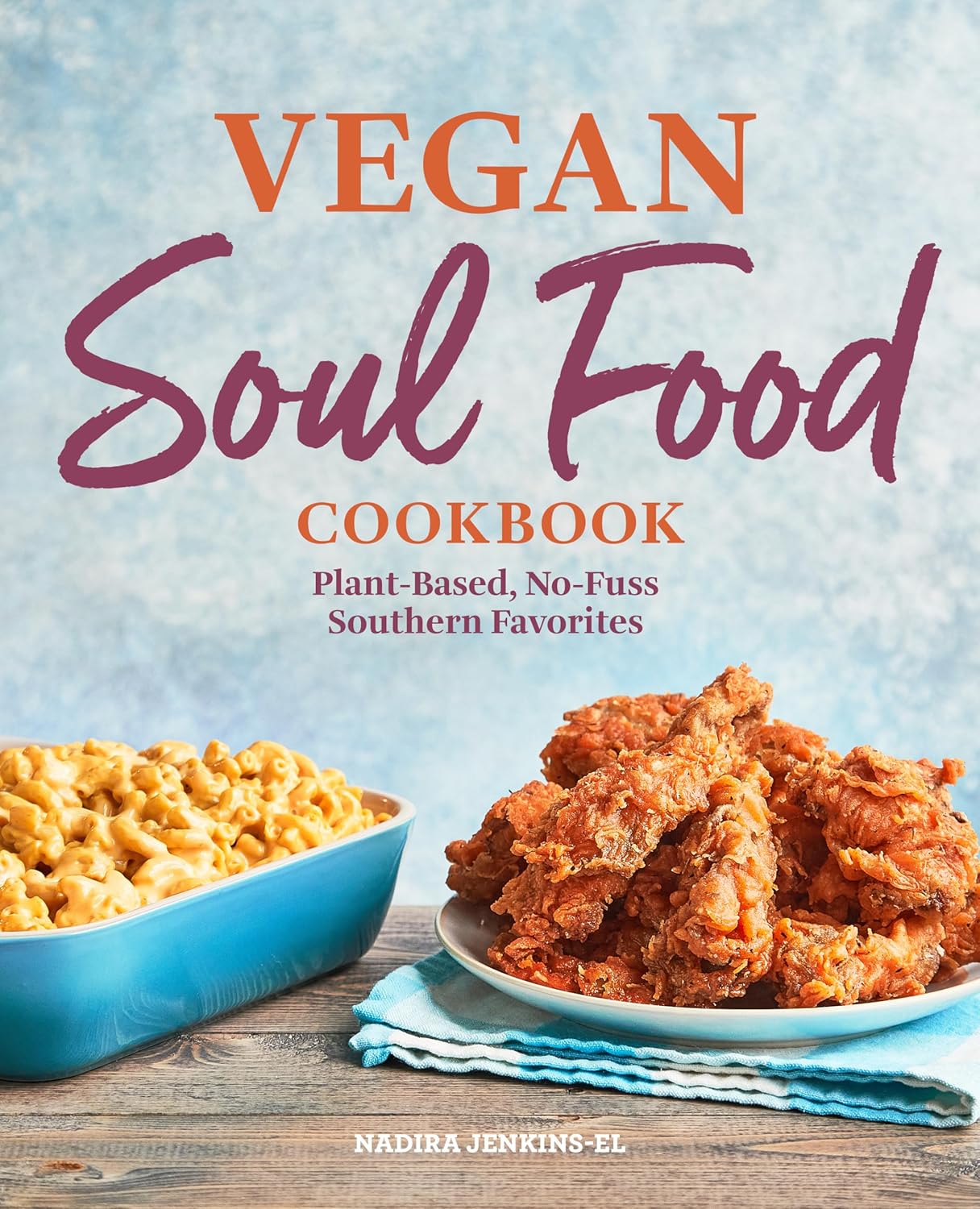
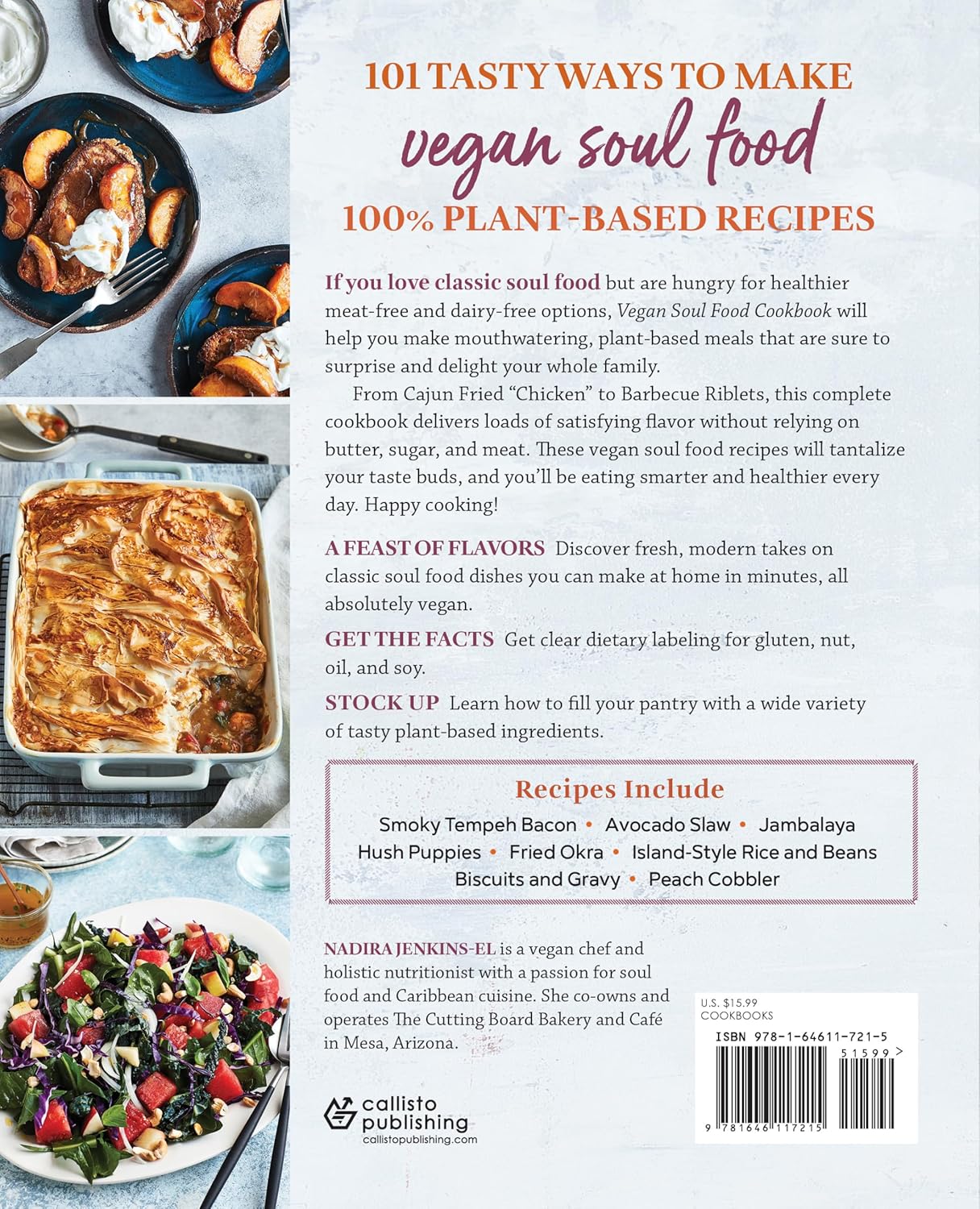
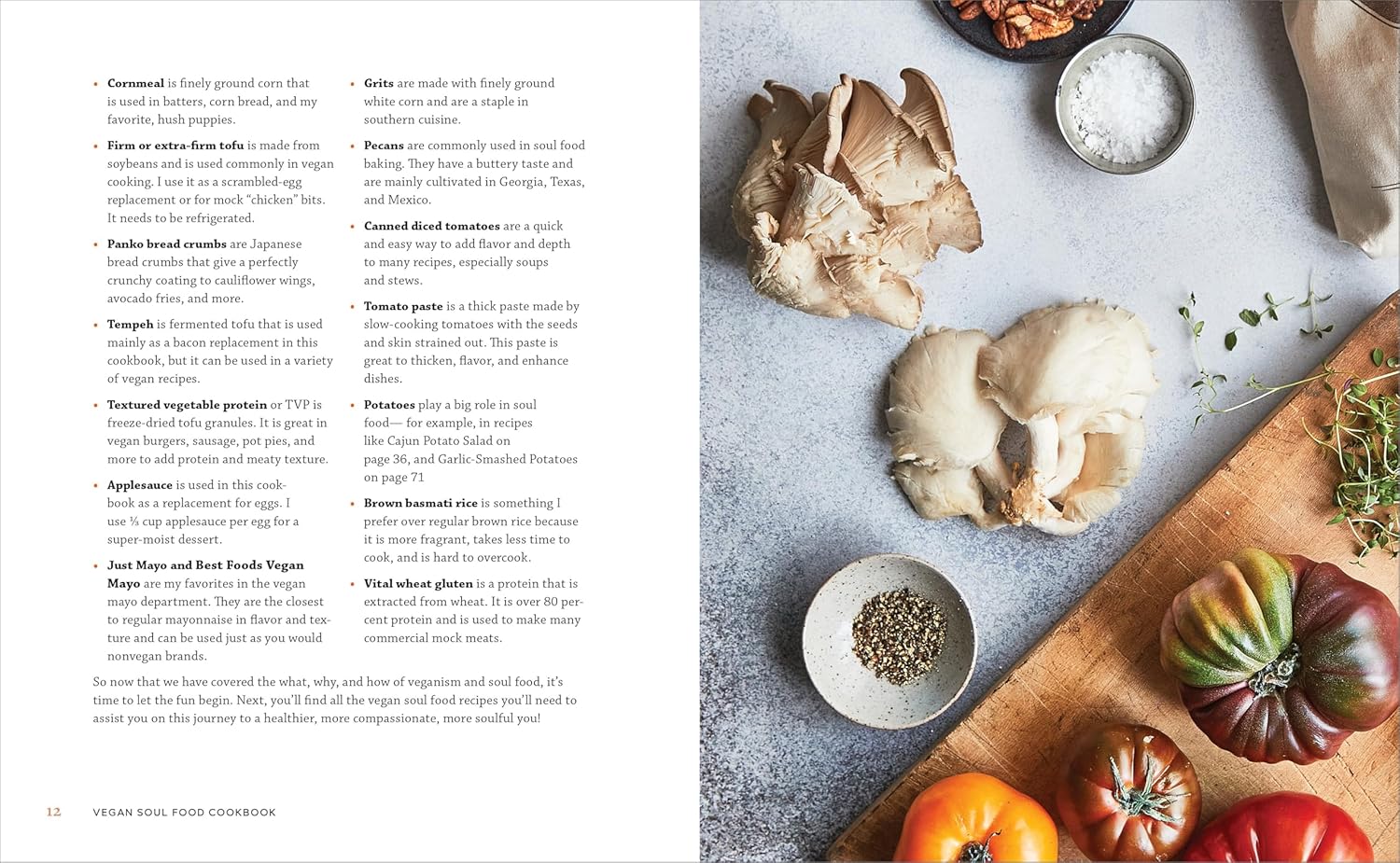
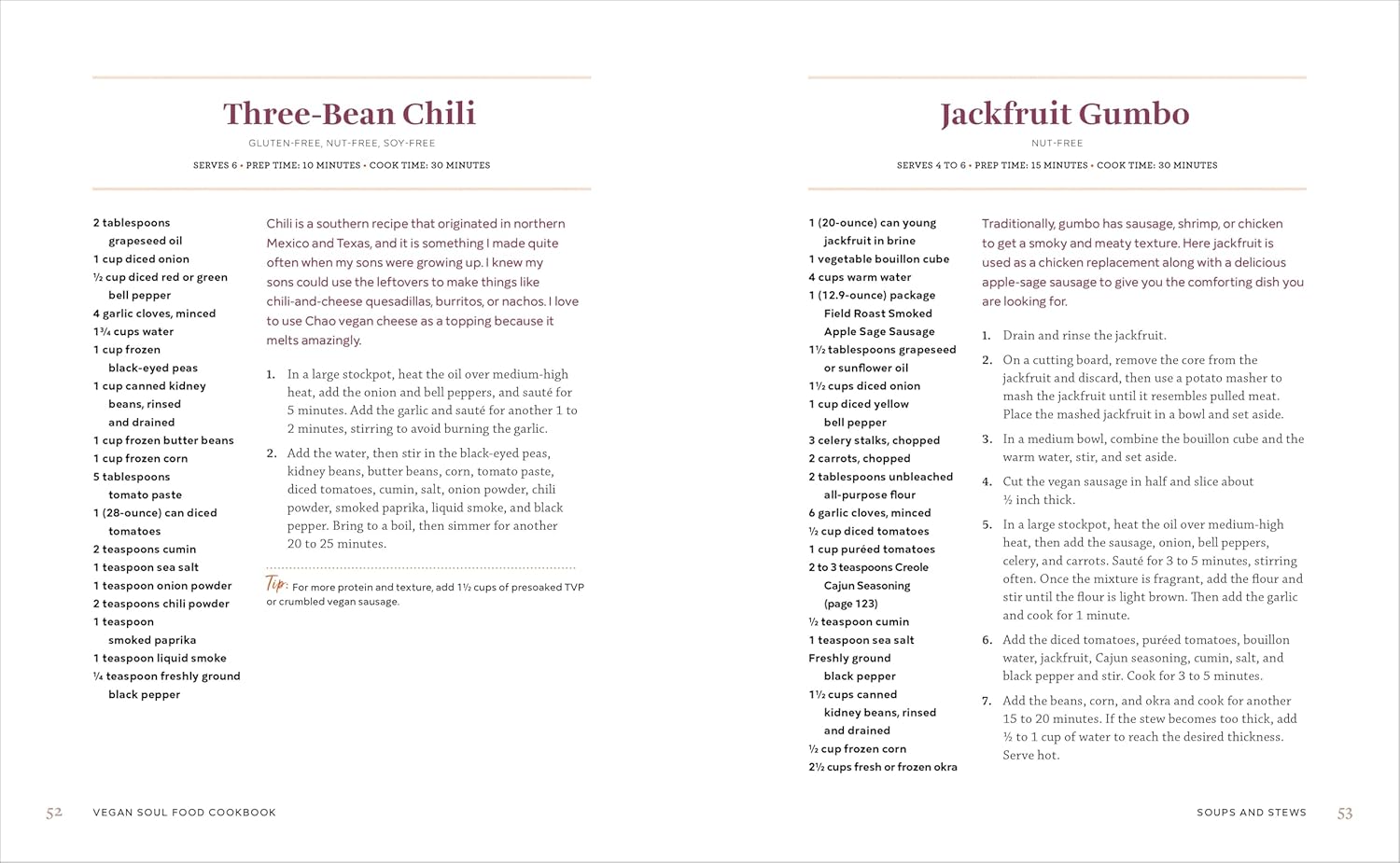
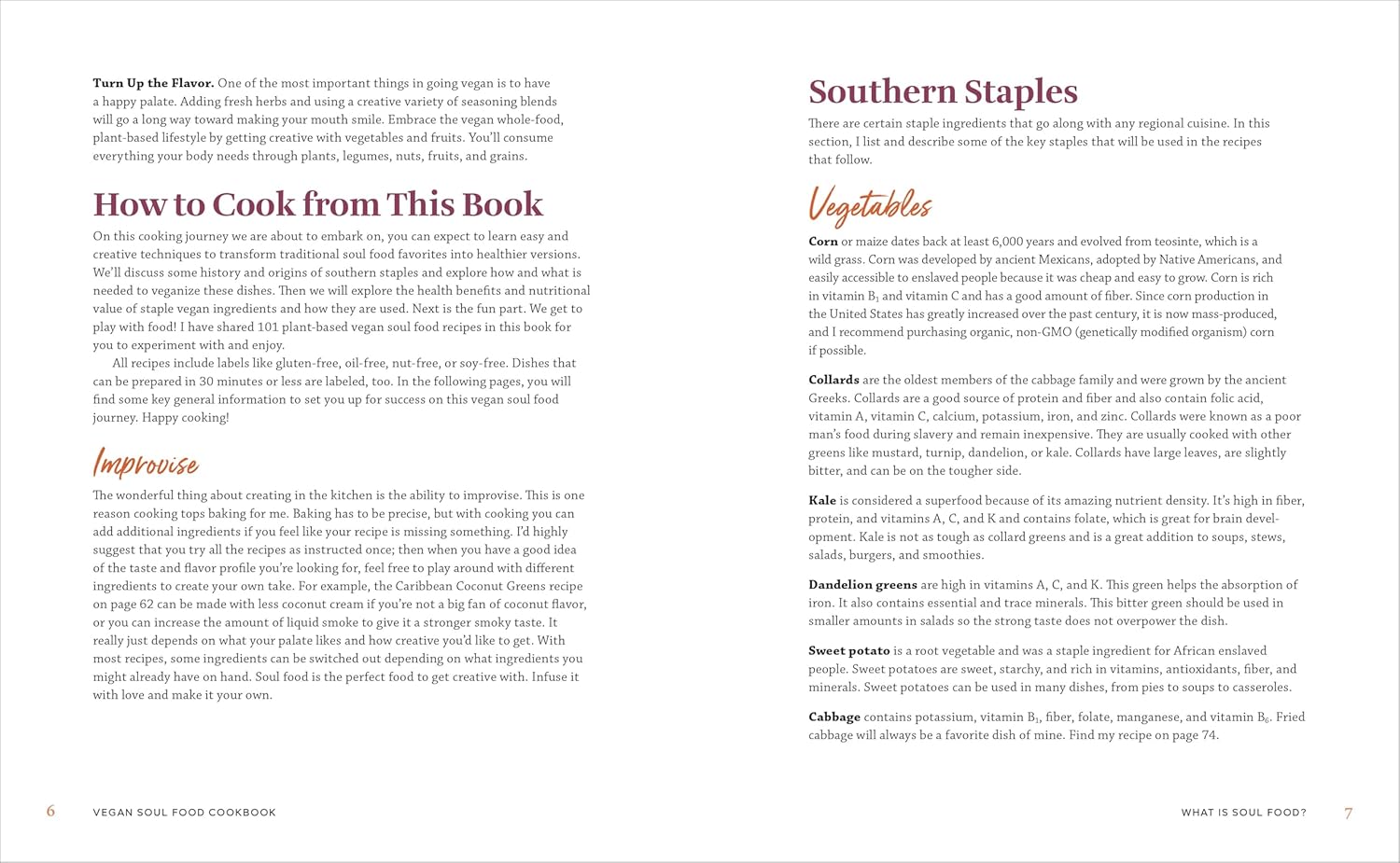

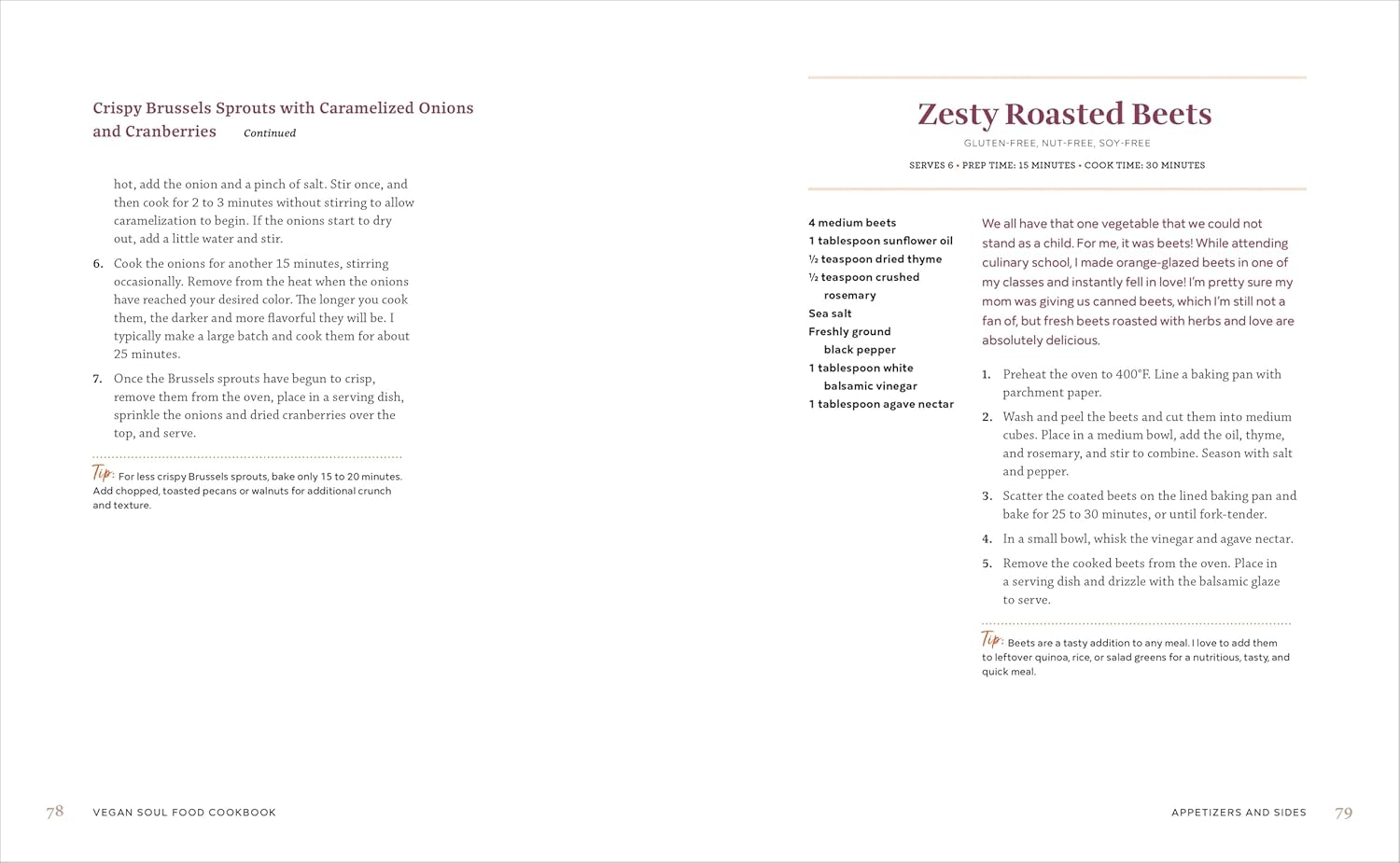
Price: $17.99 - $9.64
(as of Sep 07, 2025 09:55:43 UTC – Details)




